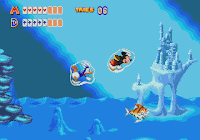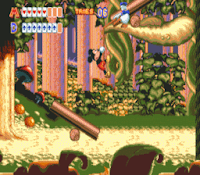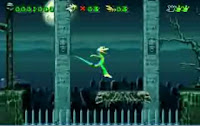 I grew up watching the Disney Channel, and didn't even know thatt Nickelodeon or Cartoon Network existed until I was nearing ten. So, it should probably come as no surprise that I played a lot of Disney games during my youth and especially anything that offered the ability to play as that cantankerous duck in a sailor suit, Donald. It just so happens that Sega's 1992 World of Illusion offered me such a treat, and I was quick to be in line for that magic show. So is the game as magical as I remember or did Sega drop the deck mid shuffle?
I grew up watching the Disney Channel, and didn't even know thatt Nickelodeon or Cartoon Network existed until I was nearing ten. So, it should probably come as no surprise that I played a lot of Disney games during my youth and especially anything that offered the ability to play as that cantankerous duck in a sailor suit, Donald. It just so happens that Sega's 1992 World of Illusion offered me such a treat, and I was quick to be in line for that magic show. So is the game as magical as I remember or did Sega drop the deck mid shuffle?The story is fairly simple. Mickey and Donald are practicing their magic act, when Donald is startled by one of the tricks, causing him to fall backwards through the curtains. This leads the two to discover a magical disappearing box. Donald, deciding that it'd be great addition to their act, hops in and immediately vanishes. Mickey, worried about his friend, begins to search for the trap door in the box when he too vanishes. As the two plummet into another world, they hear a voice telling them that besting him in magic is the only way he'll allow them to escape from his domain. Now, Mickey and Donald must traverse this world of magic and illusion if they ever want to see home again.
Visually, the game is gorgeous with detailed spirits and fluid animations. The world is as bright and cheerful as one would expect from the House of Mouse and Sega, and the levels exude that charm that is all but mandatory in a Disney game.
Though there are only 5 levels, each seems to to send the player to a multitude of various locations. From the forests to the mountains and under the sea, Donald and Mickey will be whisked to several beautiful and whimsical areas, and that doesn't even cover the stranger stages like a giant study, a world of cookies, or wonderland itself.
 The enemy sprites are either pulled straight from various Disney movies and shorts, or they are made up of common characters that have been tweaked to make them fit into the theme of the level, such as Tweedledee and Tweedledum being redone as poppers for the Christmas Tree level.
The enemy sprites are either pulled straight from various Disney movies and shorts, or they are made up of common characters that have been tweaked to make them fit into the theme of the level, such as Tweedledee and Tweedledum being redone as poppers for the Christmas Tree level.The gameplay is fairly simple. The A button runs, B attacks, and C jumps. Though simple, the layout controls feels a bit awkward, especially as I like having the run button close to jump. Luckily, the controls are fully customizable, and it seems that their is no difference between a walking jump and a running jump.
As the game was meant for children, the action is of a nonviolent nature. The attack button cause Donald or Mickey to swing out a magical cape, which transforms their enemies into harmless magical items such as a dove or a card. Whether that is a worse fate than death, I'm not entirely sure.
The game is also very short. I was able to beat the game in about forty minutes the first time through as Donald, in about thirty as Mickey, and in about an hour during the two player mode. World of Illusion isn't a game that would last a seasoned platformer very long, but it's the perfect length for kids.
Luckily, though short, the game does have a good bit of replayability, due eniterly to the fact that each character has a unique segment in each of the five levels. The levels follow a specific pattern by starting the characters in a shared environment before sending them to their own section, which is followed by another shared section, which ends in a boss battle.
It is my opinion that the differences between each characters levels replaces the difficulty options. For example, during the third level (an underwater level), Mickey is able to crawl through a small gap and ends up in the belly of a whale. Donald, on the other hand, can't fit his large rump through the gap and is forced to double back and swim to the surface for a more challenging platforming section. Of course, if the game were being played by two players, than Mickey would be able to pull Donald through the gap, which would send the pair to either Atlantis or a bizarrely dry version of King Triton's Palace.
 That leads us to probably the best bit about the game. It is not only a two player game, but an actual cooperative game. The players must work together to not only overcome enemies but obstacles as well. They can stand on each other's shoulders to reach high platforms, lower ropes, and help push a handcar through a collapsing mine.
That leads us to probably the best bit about the game. It is not only a two player game, but an actual cooperative game. The players must work together to not only overcome enemies but obstacles as well. They can stand on each other's shoulders to reach high platforms, lower ropes, and help push a handcar through a collapsing mine.Each of the cooperative sections are more challenging (due to the cooperative nature) and often more inventive than the single player sections, except for the final one. Where as in the single player game Mickey or Donald explore the area behind the mirror or a hedge maze respectively, in the cooperative mode, the two end up in a room of doors, each of which takes them back to an already explored area. Seeing as the game is only an hour long, the section ends up feeling extremely tedious.
The bosses, unfortunately, are no different between the various modes, meaning that they are even more simple on the two player game. Most bosses take about five hits to bring down, and when two players are working in tandem there isn't really any strategy required.
After each boss, Mickey and Donald are granted a tome of magical knowledge, which will grant them a spell that will get them through the next level. These spells are mostly just varying modes of transportation, such as a magic carpet, a bubble that allows them to breathe underwater, and a teleportation spell. Even the spell that allows them to control cards does little more than create platforms. Though these spells don't change the gameplay up to drastically, they add to the magic of the game and are still enjoyable if only because hearing Donald say "Alakazam" is always amusing.
The music is definitely the highlight of the game. It covers a wide range of styles and almost all of them are pleasing even if they aren't terribly memorable. Unfortunately, the same can't be said about the sound affects, though most are passable, some, such as the sound of swimming in the bubble, are grating to the ears.

All in all, World of Illusion is a well made game. It's beautiful, and the music is wonderful. However, it's simply too easy to be played multiple times by someone good at these types of games. Yet, if you have a kid that has a friend, than this game would probably be right up their alley.




